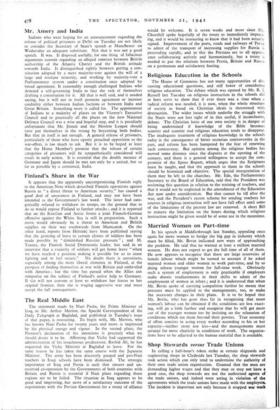Religious Education in the Schools
The House of Commons has not many opportunities of dis- cussing educational questions, and still fewer of considering religious education. The debate which was opened by Mr. R. J. Russell last Tuesday on religious instruction in the schools did at least serve to show that if ever there was a time when a radical reform was needed, it is now, when the whole structure of society as based on Christian ideals is threatened with destruction.. The wider issues which underlie the struggle with the Nazis were not lost sight of in this useful, if inconclusive, debate. The Christian basis of our own society is in, danger of being undermined if knowledge of the Bible becomes scantier and scantier and religious education tends to disappear. The inadequate treatment of religious knowledge in the schools today is the consequence of bitter sectarian controversies in the past, and reform has been hampered by the fear of renewing such controversy. But opinion among the religious bodies has moved some distance since the disputes at the opening of the century, and there is a general willingness to accept the com- promise of the Spens Report, which urges that the Scriptures must be taught, and that the approach to them in the schools should be historical an objective. The special interpretation of them may be left to the churches. Mr. Ede, the Parliamentary Secretary to the Board of Education, said that the President was reviewing this question in relation to the training of teachers, and that it would not be neglected in the amendment of the Education Act now under consideration. But that cannot be till after the war, and the President's recent scheme for sending teachers for courses iii religious instruction will not have full effect until some of the limitations of the present law are removed. A short Bill to remove the limitation on the hours during which religious instruction might be given would be of some use in the meantime.


























 Previous page
Previous page